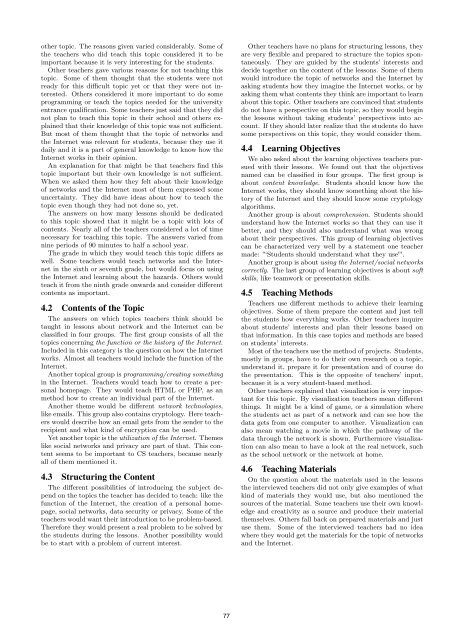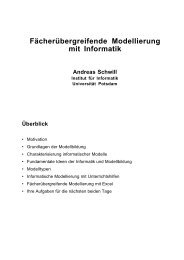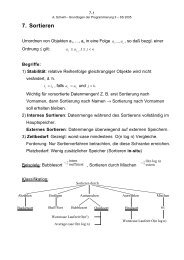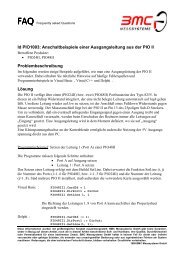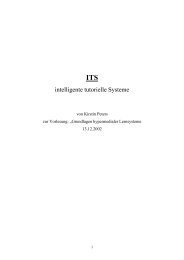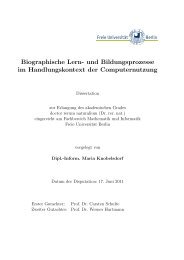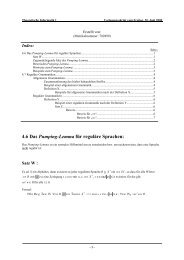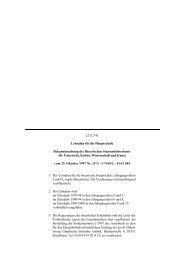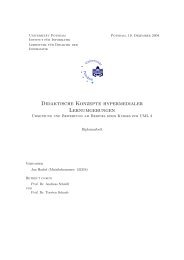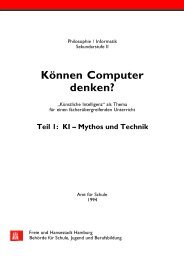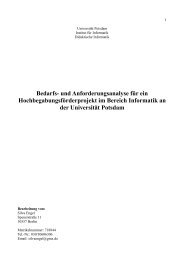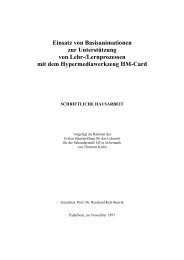Maria Knobelsdorf, University of Dortmund, Germany - Didaktik der ...
Maria Knobelsdorf, University of Dortmund, Germany - Didaktik der ...
Maria Knobelsdorf, University of Dortmund, Germany - Didaktik der ...
You also want an ePaper? Increase the reach of your titles
YUMPU automatically turns print PDFs into web optimized ePapers that Google loves.
other topic. The reasons given varied consi<strong>der</strong>ably. Some <strong>of</strong><br />
the teachers who did teach this topic consi<strong>der</strong>ed it to be<br />
important because it is very interesting for the students.<br />
Other teachers gave various reasons for not teaching this<br />
topic. Some <strong>of</strong> them thought that the students were not<br />
ready for this difficult topic yet or that they were not interested.<br />
Others consi<strong>der</strong>ed it more important to do some<br />
programming or teach the topics needed for the university<br />
entrance qualification. Some teachers just said that they did<br />
not plan to teach this topic in their school and others explained<br />
that their knowledge <strong>of</strong> this topic was not sufficient.<br />
But most <strong>of</strong> them thought that the topic <strong>of</strong> networks and<br />
the Internet was relevant for students, because they use it<br />
daily and it is a part <strong>of</strong> general knowledge to know how the<br />
Internet works in their opinion.<br />
An explanation for that might be that teachers find this<br />
topic important but their own knowledge is not sufficient.<br />
When we asked them how they felt about their knowledge<br />
<strong>of</strong> networks and the Internet most <strong>of</strong> them expressed some<br />
uncertainty. They did have ideas about how to teach the<br />
topic even though they had not done so, yet.<br />
The answers on how many lessons should be dedicated<br />
to this topic showed that it might be a topic with lots <strong>of</strong><br />
contents. Nearly all <strong>of</strong> the teachers consi<strong>der</strong>ed a lot <strong>of</strong> time<br />
necessary for teaching this topic. The answers varied from<br />
nine periods <strong>of</strong> 90 minutes to half a school year.<br />
The grade in which they would teach this topic differs as<br />
well. Some teachers would teach networks and the Internet<br />
in the sixth or seventh grade, but would focus on using<br />
the Internet and learning about the hazards. Others would<br />
teach it from the ninth grade onwards and consi<strong>der</strong> different<br />
contents as important.<br />
4.2 Contents <strong>of</strong> the Topic<br />
The answers on which topics teachers think should be<br />
taught in lessons about network and the Internet can be<br />
classified in four groups. The first group consists <strong>of</strong> all the<br />
topics concerning the function or the history <strong>of</strong> the Internet.<br />
Included in this category is the question on how the Internet<br />
works. Almost all teachers would include the function <strong>of</strong> the<br />
Internet.<br />
Another topical group is programming/creating something<br />
in the Internet. Teachers would teach how to create a personal<br />
homepage. They would teach HTML or PHP, as an<br />
method how to create an individual part <strong>of</strong> the Internet.<br />
Another theme would be different network technologies,<br />
like emails. This group also contains cryptology. Here teachers<br />
would describe how an email gets from the sen<strong>der</strong> to the<br />
recipient and what kind <strong>of</strong> encryption can be used.<br />
Yet another topic is the utilization <strong>of</strong> the Internet. Themes<br />
like social networks and privacy are part <strong>of</strong> that. This content<br />
seems to be important to CS teachers, because nearly<br />
all <strong>of</strong> them mentioned it.<br />
4.3 Structuring the Content<br />
The different possibilities <strong>of</strong> introducing the subject depend<br />
on the topics the teacher has decided to teach: like the<br />
function <strong>of</strong> the Internet, the creation <strong>of</strong> a personal homepage,<br />
social networks, data security or privacy. Some <strong>of</strong> the<br />
teachers would want their introduction to be problem-based.<br />
Therefore they would present a real problem to be solved by<br />
the students during the lessons. Another possibility would<br />
be to start with a problem <strong>of</strong> current interest.<br />
77<br />
Other teachers have no plans for structuring lessons, they<br />
are very flexible and prepared to structure the topics spontaneously.<br />
They are guided by the students’ interests and<br />
decide together on the content <strong>of</strong> the lessons. Some <strong>of</strong> them<br />
would introduce the topic <strong>of</strong> networks and the Internet by<br />
asking students how they imagine the Internet works, or by<br />
asking them what contents they think are important to learn<br />
about this topic. Other teachers are convinced that students<br />
do not have a perspective on this topic, so they would begin<br />
the lessons without taking students’ perspectives into account.<br />
If they should later realize that the students do have<br />
some perspectives on this topic, they would consi<strong>der</strong> them.<br />
4.4 Learning Objectives<br />
We also asked about the learning objectives teachers pursued<br />
with their lessons. We found out that the objectives<br />
named can be classified in four groups. The first group is<br />
about content knowledge. Students should know how the<br />
Internet works, they should know something about the history<br />
<strong>of</strong> the Internet and they should know some cryptology<br />
algorithms.<br />
Another group is about comprehension. Students should<br />
un<strong>der</strong>stand how the Internet works so that they can use it<br />
better, and they should also un<strong>der</strong>stand what was wrong<br />
about their perspectives. This group <strong>of</strong> learning objectives<br />
can be characterized very well by a statement one teacher<br />
made: ”‘Students should un<strong>der</strong>stand what they use”’.<br />
Another group is about using the Internet/social networks<br />
correctly. The last group <strong>of</strong> learning objectives is about s<strong>of</strong>t<br />
skills, like teamwork or presentation skills.<br />
4.5 Teaching Methods<br />
Teachers use different methods to achieve their learning<br />
objectives. Some <strong>of</strong> them prepare the content and just tell<br />
the students how everything works. Other teachers inquire<br />
about students’ interests and plan their lessons based on<br />
that information. In this case topics and methods are based<br />
on students’ interests.<br />
Most <strong>of</strong> the teachers use the method <strong>of</strong> projects. Students,<br />
mostly in groups, have to do their own research on a topic,<br />
un<strong>der</strong>stand it, prepare it for presentation and <strong>of</strong> course do<br />
the presentation. This is the opposite <strong>of</strong> teachers’ input,<br />
because it is a very student-based method.<br />
Other teachers explained that visualization is very important<br />
for this topic. By visualization teachers mean different<br />
things. It might be a kind <strong>of</strong> game, or a simulation where<br />
the students act as part <strong>of</strong> a network and can see how the<br />
data gets from one computer to another. Visualization can<br />
also mean watching a movie in which the pathway <strong>of</strong> the<br />
data through the network is shown. Furthermore visualization<br />
can also mean to have a look at the real network, such<br />
as the school network or the network at home.<br />
4.6 Teaching Materials<br />
On the question about the materials used in the lessons<br />
the interviewed teachers did not only give examples <strong>of</strong> what<br />
kind <strong>of</strong> materials they would use, but also mentioned the<br />
sources <strong>of</strong> the material. Some teachers use their own knowledge<br />
and creativity as a source and produce their material<br />
themselves. Others fall back on prepared materials and just<br />
use them. Some <strong>of</strong> the interviewed teachers had no idea<br />
where they would get the materials for the topic <strong>of</strong> networks<br />
and the Internet.


